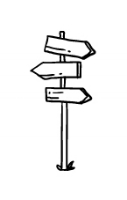My love of travel over the years has taught me to be smart about managing money. I made some mistakes early on (ie. not understanding exchange rates and drastically overpaying for souvenirs). Yeah, they were learning experiences, and that is part of a gap year -- you are free to make mistakes and learn from them. Another core lesson I learned from traveling: heed the advice of people who have been there before me. Hopefully some of the lessons I learned throughout my years of traveling can help you to save some money and make smart financial choices during your gap year.
Make a Budget (and stick to it!)
How much money will you need for basic necessities (food, lodging, transportation)? I have found the Lonely Planet budget suggestions (Divided by: Budget, Midrange, Top End) to be pretty accurate. Figure out which category suits your travel style, and multiply that by the number of days you plan to travel in that region. ie. $30 per day in South America will mean you can expect to stay in hostels, prepare most of your own food or eat at inexpensive local markets, and walk or take public transportation.
Keep track of your expenses and if you accidentally go over one day, expect to cut back your expenses another day to make up for it. If you have trouble sticking to your budget, try only taking enough money with you that you have allotted for that day. Store your remaining money securely in a locker in your hostel. If there is no locker, or if you are in a private room, stash your extra cash and valuables inside a backpack or bag with zippers. Lock the zippers to one another with a small combo lock.
There will undoubtedly be excursions or more costly activities you'll want to participate in during your gap year. If you can swing it, add an extra cushion to your budget for that Amazon experience or trek to Machu Picchu. Plan ahead so you don't have to miss out on a once in a lifetime opportunity. Research companies (or ask your gap year advisor for recommendations) to ensure you get good experience from your investment.
If you are already on a shoestring budget, consider looking into work or volunteer opportunities that might subsidize your housing and food costs for a portion of your gap year. Authentic encounters where you get to spend meaningful time with locals are often the most memorable parts of a gap year experience. You'll be able to save up cash that you can use for the more "touristy" parts of your gap year.
Me during a week volunteering at an elephant conservation center in Thailand
Accessing Cash
Traveling with up to $200 cash in newer bills as a back up fund is a good plan, especially if you are traveling independently. Though I do not recommend bringing all of your budget in cash. You run the risk of having it stolen, plus you will waste money on exchange fees each time you exchange USD to local currencies. No matter where you go, you will see money exchange businesses that advertise "no commission" or "no exchange fees". This is not true! Do not be deceived. Currency exchangers make money by giving you an unfavorable exchange rate. The exchange rates offered at currency exchange booths are rarely, if ever, competitive to those offered by banks when you withdraw cash from an ATM.
Bring a debit card with a chip to withdraw local currency from ATMs. Visa tends to be the most widely accepted, though MasterCard is also an option. I typically recommend participants also bring a back up credit card (Visa or MasterCard with a chip) for emergencies (or in case the debit card is lost, stolen, or does not work). Be aware of the fees that your bank charges for accessing an ATM that is not affiliated with your bank, as well as foreign transaction fees and conversion fees. These can really add up. I suggest withdrawing larger amounts (no less than the local currency equivalent of $100) to minimize the frequency of your withdraws and fees assessed by your bank.
If you plan to do a lot of traveling, or for a long period of time, you might consider opening a checking account with Charles Schwab or Fidelity. Both offer checking accounts linked to brokerage or mutual funds with free ATM withdraws worldwide.
Store your extra cash and backup credit card separate from your debit card and money you have allotted to spend for the next few days. If something is lost or stolen you will have a backup plan. Many debit and credit cards now come with access to block your cards via your online account. If you can't do this, be sure you have the account numbers and international customer service numbers noted somewhere so that you can immediately report the loss if this happens.
Ways to Stretch Your $$$
Take a re-usable water bottle (and Steripen if you won't be able to drink the tap water)
Bring your water bottle with you, always
Minimize your alcohol consumption (alcoholic beverages are often as expensive as a meal)
Travel like locals (bus, subway, bicycle, by foot) Only take taxis when necessary or for safety
Stay in hostels or locally owned guesthouses
Bring a quick dry towel and combo lock to avoid having to rent them
Eat like locals / Shop at local markets and cook your own food
Avoid touristy areas for meals (quality is usually poor and prices are inflated)
Be frugal but don't obsess over every dollar. Don't miss out on once in a lifetime opportunities. When in situations where bargaining is culturally appropriate, bargain, but consider the significance of that amount of money to you compared to the person with whom you are bargaining.



